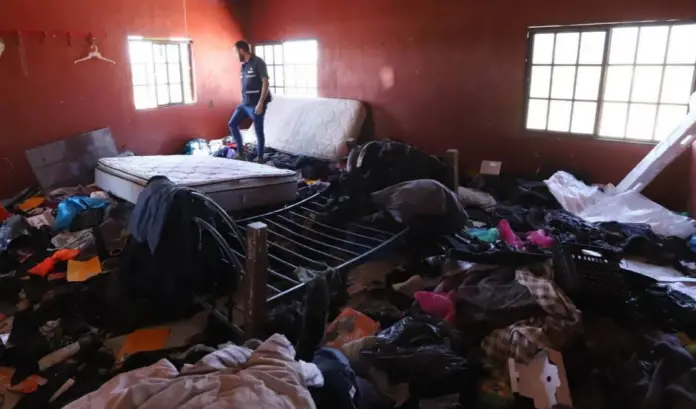After the discovery of clothing and personal belongings at the Izaguirre ranch in Teuchitlán, Jalisco, families from Colima and Zacatecas have identified clothing that could belong to their missing loved ones.
However, hope of finding them alive is fading due to the possibility that they may have been victims of clandestine crematoriums.
Colima families travel in search of answers
In Colima, at least 10 families plan to travel to Teuchitlán in the coming days to participate in the identification process. Among them is Lorena, the mother of a young man who disappeared seven years ago, who recognized some of her son’s clothing in images posted on social media.
“There I saw two size 38 pants and two XL shirts; those were the clothes my son was wearing. It’s a very slim hope that we can locate him,” said Lorena.
Families from Colima and Zacatecas identified clothing. Photo: Cuartoscuro
However, the possibility that her relative was cremated in the ranch’s clandestine ovens fills her with uncertainty.
“If my son was left there in the crematoriums, I won’t know, because when a person is burned or disintegrates, there is no genetic connection,” she lamented.
In Zacatecas, at least six families have identified personal belongings, such as clothing and backpacks, in the catalog released by the Jalisco Prosecutor’s Office. These families have contacted groups of searching mothers, who are guiding them through the identification process.
“We are providing guidance, telling them to pass the information on to their Public Prosecutors, to do so in writing, so that their collaboration can be requested directly from Jalisco and the process can be expedited,” explained one searching mother.
Challenges in Identifying Remains from the Izaguirre Ranch
Although families maintain hope for closure, collectives acknowledge that the task will be difficult and, in many cases, impossible.
“The clothes are not exclusive to one person; they are made for many more. Even if they match, they may not belong to their loved ones,” said a searching mother from Zacatecas.
Furthermore, the destruction of human remains in crematoriums complicates identification.
“The way many of them were destroyed means they will never be located or their identity recovered,” she added.
While families wait for the Colima Prosecutor’s Office to report on the protocols for transferring them to Jalisco, collectives and citizens have called for a march this Saturday in Colima to mourn the discovery in Teuchitlán.
Source: unotv




